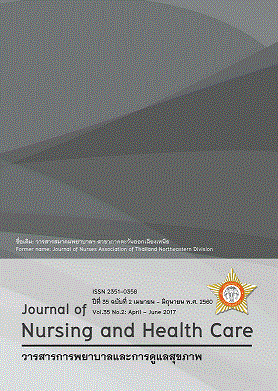พฤติกรรมการดูแลตนเองของผู้ที่ได้รับการล้างไตทางช่องท้องอย่างต่อเนื่องที่มีภาวะแทรกซ้อน Self-Care Behavior among Persons with Continuous Ambulatory Peritoneal Dialysis Experiencing Complications
คำสำคัญ:
พฤติกรรมการดูแลตนเอง การล้างไตทางช่องท้องอย่างต่อเนื่อง ภาวะแทรกซ้อนจากการล้างไตทางช่องท้องอย่างต่อเนื่อง Self-Care behavior, continuous ambulatory peritoneal dialysis, complication in peritoneal dialysis/ dialysis exchangeบทคัดย่อ
บทคัดย่อ
การวิจัยครั้งนี้เป็นการวิจัยเชิงบรรยาย เพื่อศึกษาพฤติกรรมการดูแลตนเองของผู้ที่รับการล้างไตผ่านทางช่องท้องอย่างต่อเนื่องที่มีภาวะแทรกซ้อน กลุ่มตัวอย่างเลือกแบบเฉพาะเจาะจงจากผู้ที่รับการล้างไตทางช่องท้องอย่างต่อเนื่องที่เข้ารับการรักษา ณ คลินิกล้างไตทางช่องท้อง โรงพยาบาลวารินชำราบ ในเดือนกุมภาพันธ์ พ.ศ. 2557 จำนวน 21 ราย เก็บข้อมูลโดยการสัมภาษณ์และการสังเกต วิเคราะห์ข้อมูลโดยสถิติบรรยายและการวิเคราะห์เชิงเนื้อหา
ผลการวิจัยพบว่า กลุ่มตัวอย่าง 2 ใน 3 รับประทานอาหาร 2-3 มื้อ และร้อยละ 90.5 เชื่อว่าการรับประทานอาหารไม่ถูกต้องทำให้เกิดภาวะแทรกซ้อน การไม่รู้สึกอยากอาหาร อาหารซ้ำซาก จำเจ มีราคาแพงและการรับประทานอาหารที่ขัดกับวัฒนธรรมดั้งเดิมเป็นอุปสรรคในการปรับการรับประทานอาหาร กลุ่มตัวอย่าง 2 ใน 3 ดื่มน้ำน้อยกว่าที่ควรได้รับ ส่วนใหญ่ไม่ได้ออกกำลังกายเนื่องจากมีน้ำในช่องท้อง เหนื่อยง่าย ปวดเสียดท้อง กลุ่มตัวอย่าง 1 ใน 2 มีเพศสัมพันธ์ลดลงเพราะความรู้สึกทางเพศลดลงและกลัวกระทบแผลช่องทางออกของสาย กลุ่มตัวอย่าง 1 ใน 3 ไม่ได้ล้างแผลด้วยตนเองเพราะกลัวไม่สะอาด ทำแผลเองไม่ถนัด มีอุปสรรคและปัญหาในการจัดหาวัสดุ-อุปกรณ์ในการเปลี่ยนน้ำยาล้างไต ในกระบวนการเปลี่ยนน้ำยาล้างไตประมาณครึ่งหนึ่งล้างมือแล้วสัมผัสสิ่งของอื่นอีกและทำแผลด้วยเทคนิคปราศจากเชื้อไม่ถูกต้อง กลุ่มตัวอย่าง 2 ใน 3 เคยประสบปัญหาทางอารมณ์ ได้แก่ รู้สึกด้อยคุณค่าในตนเอง วิตกกังวล เบื่อหน่ายและท้อแท้ เป็นต้น
Abstract
This descriptive research was designed to explore self-care behaviors among people with continuous ambulatory peritoneal dialysis who experienced complications. Twenty-one patients with continuous ambulatory peritoneal dialysis (CAPD) receiving treatment at the outpatient’s department of Warinchamrab Hospital in February 2014 were purposively recruited. A semi-structure interview and observation were used for data collection. Data analysis included descriptive statistics analysis and content analysis.
Study findings revealed that two-thirds of the sample had 2-3 meals/day in which 90.48 percent believed that inappropriate diet lead to complications. Poor appetite, repetitious and monotonous food, high cost, and conflicts to traditional beliefs were listed as barriers of suggested diet modification. Two-thirds of the sample drank less water than suggested. Most of them did not exercise due to excessive water in the abdominal cavity, fatigue, and abdominal discomfort. Approximately 78% of the sample had decrease sexual activity due to sexual desire diminution and fear of impact on exit site wound. According to unconfident, one-third of the sample did not do wound dressing by themselves Major barrier related to dialysis among this sample was difficulty in getting supplies and equipment. During the process of dialysis exchange, almost half of sample contaminated sterile material by touching unsterile appliance after hand washing. Most of the sample experienced emotional problems including feelings of poor self-esteem, anxiety, discouragement and hopelessness.



